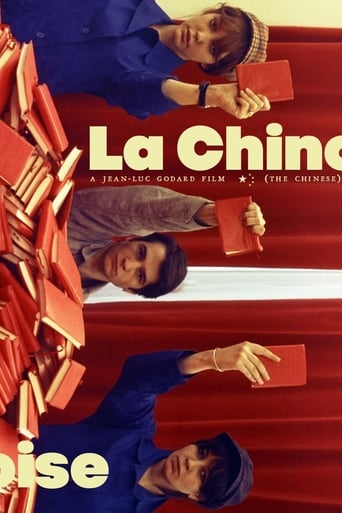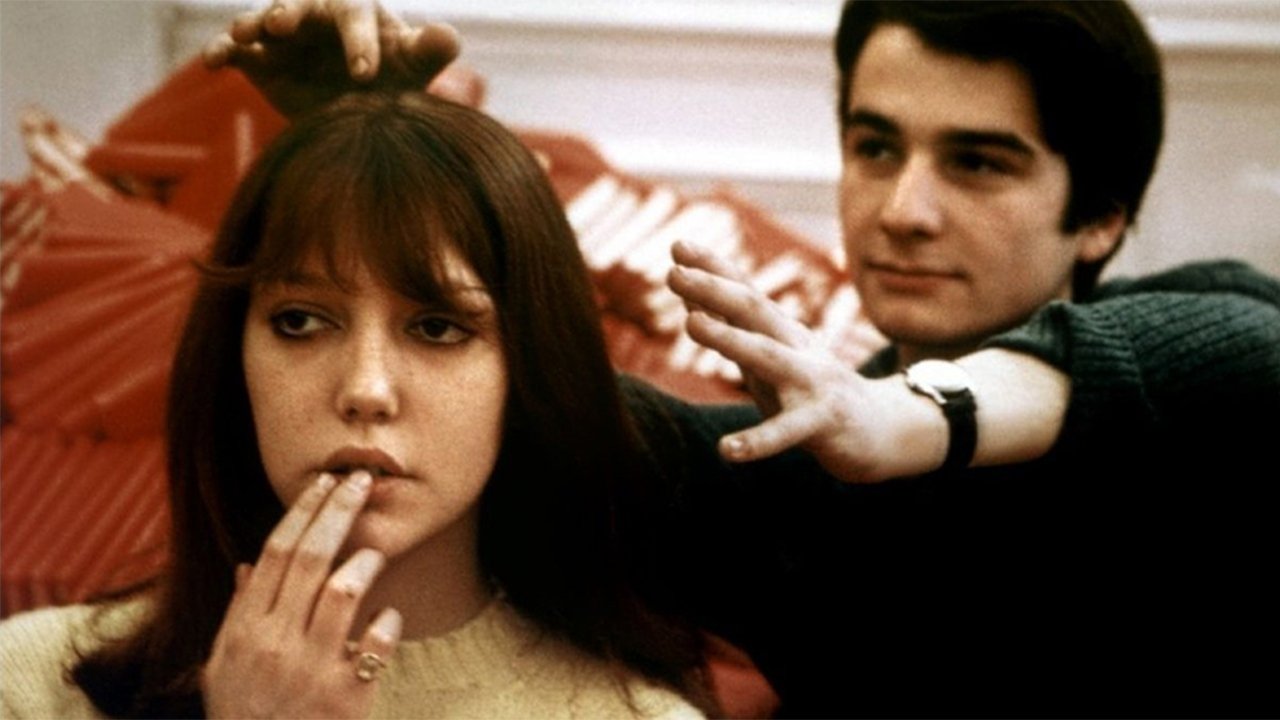theskylabadventure
Roman Polanksi once said that "people like Godard are like little kids playing at being revolutionaries", noting that he had actually grown up surrounded by the realities of communism. As a general rule I would always try to avoid a filmmaker's personal tastes, opinions and politics but, as La Chinoise is essentially a political statement, it's impossible not to let the Godard's politics affect my opinion of it. Sadly, Polanski's comment sums this film up perfectly.There is no plot. What we are subjected to amounts to little more than a series of vignettes of utterly bourgeois adolescents rambling their tin- pot political philosophies from the comfort of their upper middle class apartments. Was this supposed to be ironic? Or are we supposed to buy into the ideas of these vacuous kids? It fails on both levels. All I wanted to do was give all of them a good slap across the chops and tell them to grow up.Am I missing the point? Do I just not get it? Perhaps, and I'm fine with that. I truly love some of Godard's films; Vivra Sa Vie, Pierrot Le Fou, Le Mepris. The difference is that all of these films had something or someone for me to care about. The one thing that might have saved La Chinoise for me would have been for all the characters to catch bubonic plague and die horribly. That's would have cheered me up.Stylistically the film has Godard written all over it but, by the time this film came out (in 1967), these flairs were already wearing a little thin, especially when they're essentially there to veil an utterly feckless piece of propaganda. The only point of vague interest here is the slightly eerie way in which this film precipitated the riots of May 1968. This alone, however, is not worth the 85 minutes of your life you will wish you could have back if you decide to sit through this twaddle.
tieman64
"Only the guy who isn't rowing has time to rock the boat." - Sartre Fyodor Dostoevsky wrote "Demons" in 1872, a novel about a group of young radicals in pre revolutionary Russia. Based loosely on Dostoevsky's tale, Jean-Luc Godard's "La Chinoise" watches as five young activists spend their summer vacation in a small apartment belonging to "wealthy factory owners who are out of town". Here they study Mao's "Little Red Book", a collection of writings on Chinese communism."La Chinoise's" first two act take place almost entirely within the group's apartment. Red, blues and whites – the colours of the French national flag – dominate. Stacks of Maoist literature line the walls and plastic toys litter the floors. A radio blasts Chinese news reports and occasionally silly Maoist pop songs. We're then introduced to Guillaume (Jean-Pierre Leaud), Veronique (Anne Wiazemsky), Yvonne, Henri and Kirlov, the only character named after a corresponding character in "Demons". It is implied that Veronique's relatives own the apartment. The kids are all in their late teens and early twenties, some prostitutes, others timid intellectuals, others related to bankers. "I'm ashamed of my wealth," Veronique says."La Chinoise's" aesthetic is now familiar, but back in the 1960s was deemed novel. Told in stylised bursts, this is a confusing amalgamation of agitprop, reality TV, documentary, cartoon, Brecht and conventional fiction. Like most of Godard's films, things only coalesce and take on power with repeated viewings. Godard hoped such a style would "shatter bourgeois aesthetics!", but of course the opposite proved true. Instead of a militant aesthetic (what he called "socialist theatre") which radicalised viewers and instigated change, audiences turned up their noses to what they deemed elitist and incomprehensible.Ironically, the film itself is about "clarity" and "gibberish". "We should replace vague ideas with clear images," one sign reads, whilst another kid states that it is "necessay to bring about the subjective and objective conditions that make revolution possible and render the use of force feasible". In short, they want to overthrow capitalism. The problem? How and what then? "There are different kinds of communism," one kid says, "different shades of red to choose from." Russian Communism, he then points out, does not truly incur the wrath of imperialist America. Chinese Communism, on the other hand, warrants the shelling of Southeast Asia and the escalation of fighting in Vietnam. Surely Maoism is thus "the right way"; a bigger threat to the status quo.This certainty is contested throughout the film. The kids are shown to be narrow-minded, sheltered, annoying, blind to ideological contradictions and nuances, uninterested in anything outside Mao and lost in their own private bubbles. They dream whilst the world spins, treating political ideology as just another pair of goofy consumer sunglasses to be picked up and discarded. On the flip side, these youths are sincere and Godard thoroughly sympathises and even agrees with them; after-all, history is littered with pampered folk like this getting the ball rolling on many human rights issues. Takes time, but still; you can't fight stupid.Godard title is a pun on the phrase "speaking Chinese" (speaking nonsense or gibberish), and also an allusion to "The Italians", a leftist cell beholden to the writings of Antonio Gramsci. Godard's cell, of course, is obsessed with Chinese rather than Italian Communism, they just struggle to morph theory into action. As the film progresses, they also become more militant. "We must suppress undesirable elements that compromise the whole," one morbidly states. Another makes a good point: "revolution costs money but the armies who put them down are free." Guillaume then learns the concept of "struggling on two fronts", which Godard turns into a specific metaphor: the revolution fights itself, its own failings and limitations, as much as the enemy.Veronique, the only character to come from wealth, eventually hatches a plan to both assassinate a visiting Soviet Minister and bomb a university. "Cut off one finger to save ten," her buddies nod like robots, and then: "We must participate in changing reality. Revolutions require terror!". In the film's best scene, Veronique discusses her plans with Francis Jeanson, a real life philosopher who was once arrested for supporting Algerian independence movements (Algeria was once a colony ruled by the French Empire). Jeanson sympathetically stresses nonviolence, seeks to talk Veronique out of her blood-lust, but she doesn't listen. If you're looking to change the rules, why start by abiding by them? Godard's shot composition is ominous: Veronique's hurtling toward history, a history to which Jeanson's back is firmly turned to.The film ends with Veronique's terrorist attacks comically failing. The group then disbands, one member committing suicide, another quitting his job, another emigrating. "Sound and fury scare me," he admits, gobbling down food in a parody of consumerism run amok. As for Guillaume, he's enveloped back into the folds of capitalism, selling fruit and metaphorically assaulted by rotten vegetables. Occasionally he visits the "Year Zero Theatre", in which he symbolically chooses who to free: a plump woman, or a skinny girl, both knocking on an invisible door. Year Zero, of course, alludes to the group's longed for day of victory. "All roads lead to Peking", a sign says, but it's a long walk. "I thought I made a leap forward," Veronique admits, "but it was but a small, timid step on a long march." The group's apartment is then sealed shut, and with it a zeitgeist, Veronique's relatives excavating rooms and unceremoniously dumping Mao's red books. Silly girl, they think. Then came 1968, in which the May day strikes (the Tet Offensive occurred weeks earlier) promptly made a fortune-teller of Godard. Here, over 11 million French workers/students took to the streets, 22 percent of the country striking. France's economy crawled to a halt. This little mini-revolution ended two weeks later, partially betrayed, no less, by the French Communist Party. Henceforth Europe's left-wing became increasingly right. Godard would slip into depression.8.5/10 – See Fassbinder's "Third Generation".
treywillwest
I've heard some claim this as Godard's seminal work. I wouldn't say quite that, but its a great, and I think misunderstood, piece of work. Everyone discusses this film as if it were a critique of the May '68 Movement, forgetting that it was released the year before, and probably filmed two years before. Everyone thus views it as a satire of the past, when it fact it is a frightened critique of the contemporary. Godard does indeed think the "Maoists" the film follows are dilettantes, as the May '68 Movement proved to be, primarily, composed of. But he also wants desperately for a more militant presence to assert itself, and lead the contemporary situation into a more legitimately revolutionary direction. The seminal scene of the film is in the last act, when the student radical meets with her professor "radical" on a train. Both sides issue futile maxims. Godard overlays the words "this situation must change!" over their conversation. The pseudo-revolution of the 1960s, Godard prays, can become a real one. In retrospect, this is somber
bobsgrock
This is more of a history and social lesson than a film and perhaps that is what Godard intended. There is no real plot or narrative to speak of, but rather various scenes showing a group of French students in their lair of socialism and Communism as they discuss and digest the many teachings and ideas from Lenin, Stalin, Mao and Marx. One thing I still don't understand about Godard is if he is advocating these beliefs or against them. Still, the film is very well-made with the primary actors giving very believable performances and Godard still messing with the basic fundamentals of film making. There is one great scene that is an unbroken shot of what must be at least 7 or 8 minutes in length. It takes place on a train passing through Paris and shows Anne Wiazmesky talking to a French politician about the cons and pros of revolution and violence. It is interesting to listen to as well as watch. This film is the same way and so is this director, though certainly not for everyone.


 AD
AD



